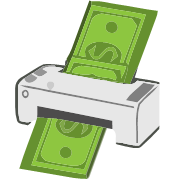Capitalism is so logical that the way you stay competitive in an emerging market is to lie to yourself and everyone around you.
 Too big to bail.
Too big to bail.
what is predicted to happen when the bubble bursts? A bunch of AI companies suddenly find out they really aren’t worth shit, and so every index fund, hedge fund, retirement fund etc on the planet that invested in them loses their shirts and we all end up holding the bag?
The short answer is more capital consolidation at the top. The few companies that survive will gobble up everyone else, and a bunch of people will lose all their savings in the process.
The entire stock market is propped up by the “Magnificent 7”, and without their outperformance over the last 2 years the market would be flat. And all of the gains to the Mag 7 stocks have come from increasing AI infrastructure. They’re essentially forced to keep spending more or investors will lose confidence and trigger a downward spiral. Of course they will eventually have to show revenue from that investment or the whole thing collapses. To put into context just how much large Nvidia has gotten since ChatGPT was unveiled - its market cap is now larger than GDP of EVERY nation aside from the US, China and Japan. And that’s from selling the chips that the hyperscalers (Microsoft, Alphabet, Meta, Amazon, Apple, Tesla) need for their AI. We are at dystopian sci-fi levels of concentration in the economy now.

we all end up holding the bag
This bubble is massive enough to where it could bankrupt the entire lower and middle income brackets.
At that point, the Buckies
 come out and hopefully the people do some
come out and hopefully the people do some  -TIME, instead of targeting each other.
-TIME, instead of targeting each other.Yeah, it’s beyond “too big to fail”. They’re gonna bail them out like crazy.
Seems like expropriating the middle class is one of the last (relatively) untapped sources of profit available to the system. There are still a decent number of retired office-workers with maybe $1M in a 401k and maybe half that in home equity. Add in the small business owners and small-time landlords. A lot of the economy is based around siphoning a couple percent here and there out of this group, but at some point they’ll get desperate and find a way to take it all at once.
Christ is it really down to that? They’re siphoning the last vestiges of what the system had previously paid out during a more equitable time? Oh god lmao
well there’s still social security that could be gutted
Yeah I’m just waiting for them to figure out how to somehow screw the index investors.
I mean, everything I’ve saved is in low cost index funds, I just assume I’m going g to wind up getting fucked and am powerless to stop it or make any choice that would keep it from happening.

And bonus points because we never actually recovered from the subprime bubble!
That’s the nature of capitalist boom/bust cycles. Each one results in a wealth transfer to the top because majority of people end up having to let go of their assets to make ends meet. In this way assets get freed up for the top percent to gobble them up. So, when the economy stabilizes the majority of the population ends up on thinner margins and less able to absorb the next crash. Eventually, enough people get pushed off the cliff so that the whole house of cards falls apart.
I think the first shocks obliterate wealth in the stock market and then the long trough/recovery is where they exact their pound of flesh back from the people they have power over.
Yeah, the market collapse tends to act as the catalyst. As the market falls, companies go out of business, and bigger capitalist can devour smaller ones. Meanwhile, all the workers end up being let go, and as people lose jobs they let go of their assets next.
I am a bit curious about how this bubble will pop, as this isn’t just overinvestment into a sector that’s not really performing. It’s over-investment into a tool to reduce and eliminate labor. The longer they ride this out, the more people will be fired in the name of ‘efficiency’. Both to increase profit margins and to sustain the momentum of the bubble itself.
But once it pops, you aren’t going to be able to get all those people back. Not immediately. Not to mention longer term losses from people leaving the industry, retiring, or just falling apart from lack of income. It could have big ripple effects on economic recovery post collapse.
It’s important to keep in mind that a lot of jobs are ultimately bullshit jobs that simply exist to make companies look more valuable to investors. The selection pressures in the current environment favor building Potemkin villages to convince investors to give them money as opposed to actually being profitable in any way.
Incidentally, have a personal anecdote on the subject I can share. I worked for a startup a few years back, and when I was hired it had around 60 people. The app they were making was incredible simple, and in no way justified the size of the company. They were around for about half a decade already, yet they made very little actual revenue with most of the money coming from VC funding. Then the Silicon Valley Bank crashed, and all of a sudden funding started to dry up. As a result, they were forced to shift their business strategy towards being solvent. The company ended up letting go of most people cutting down to around 10 or so which was the realistic number of people needed to develop the product. They’re still around today, but their product architecture is much simpler and the size of the company is still much smaller.
I expect we’ll see a lot of this happening when the AI bubble pops. Companies will either figure out ways to actually be profitable, or they will simply go under. I expect the latter will be the case for the vast majority because they don’t have a viable business model. The crash will result in a huge reserve army of labor being created and the few surviving companies will have little trouble hiring people back. In fact, I expect that the dynamic will significantly shift in favor of the employers are a result.
It’s important to keep in mind that a lot of jobs are ultimately bullshit jobs that simply exist to make companies look more valuable to investors. The selection pressures in the current environment favor building Potemkin villages to convince investors to give them money as opposed to actually being profitable in any way.
Isn’t this in contradiction with the supposed value that generative AI creates for firms? The whole point of the hype bubble is the speculation that they will be able to eliminate jobs to save on labor costs.
exactly, now startup executives can bilk investors using ai to replace dozens of bullshit jobs with automated bullshit. think of the savings!
Or just gesture at AI and not actually use it. In the example given, the firm started at around 60 people to attract investment and then stabilized at around 10. With AI hype they can skip that step where they start off with 60 people to attract investment and just start out with the 10 they really need, and explain their small startup staff as being a result of efficiencies created by AI.
Surely this is a real economy that produces real value and isn’t a circus tent of clowns picking each other’s pockets.
 i’m working on an app that enables clowns to statistically identify the most profitable clown pockets to pick while siphoning off a small percentage for myself and a few dozen chatbots, perhaps you’d like to invest?
i’m working on an app that enables clowns to statistically identify the most profitable clown pockets to pick while siphoning off a small percentage for myself and a few dozen chatbots, perhaps you’d like to invest?

That’s the new paradigm the AI companies are selling. Their claim is that they will be able to eliminate a lot of the need for human labor that currently exists. If that were to actually happen then investors would have to adjust how they evaluate growth of the companies they invest into. The number of employees has always been just a lazy metric that companies learned to game anyways. This can easily end up being swapped for a different superficial metric like the number of LLM tokens the companies are consuming.
so is the play just holding cash until it bursts then buy the dip?
Consider if you had done just that this January after seeing this post. You would have missed out on ~14.5% gains in the S&P 500, and still be waiting for the bubble to burst.
Everyone would love to be the guy who sold right before the great recession and bought at absolute rock bottom, but then again everyone would love to be the guy who went all in on NVIDIA in 2016–only, very few of us luck into being that guy. For the rest of us, time in the market beats timing the market.
If you’re worried about an impending correction you might want to shift your allocations towards bonds instead of equities. The exact proportions would depend on your overall retirement plan.
not only that, if you bought in at the peak in 2007 and held until 2017, you made out like +60%, recession included
Cash will depreciate with inflation, especially now that the Fed is going to raise rates again. The usual play is to buy gold, which has been going way up for awhile now.
Cash is considered a safe-haven asset though, and it is the most liquid. Other safe-haven assets are government bonds, defensive stocks.
Also I don’t really know what I’m talking about.
i should’ve done this one year ago
The price of gold tends to go up during bad times and down during good times, so I think that industry is essentially just profiting off people’s fears, and buying now (when it’s price is going up) is a bad long term plan
If one believes the stock market will crash soon and gold price will decline less than other assets, then it still might make sense to buy gold, but I’m not smart enough to time the market like that.
It’s fairly common and simple to exit the market when the price goes below it’s 200 day moving average, and re-enter when it goes back above. It will incur losses if the market keeps bobbing up and down around the average though, but the rule keeps you out during the big crashes and keeps you in during the big bull runs. Some also require a rising unemployment rate to reduce false positives. We are currently way above the 200 day moving average. If I remember correctly, long term returns are slightly worse than simple buy and hold, but portfolio volatility is reduced a lot, because bear markets are more volatile. You will never know how high it can go at the top or how low it can go at the bottom.
If I had money to gamble with and no conscience I would put it in arms manufacturing. It seems pretty obvious that our
toiletsleaders have chosen that to be the growth sector for the foreseeable future.toilets?
The wonders of autocorrect…
The Andruil IPO is probably going to make a lot people rich
deleted by creator
The bigger they are the harder they fall







Let’s say it did pop. What publically traded companies would get hit hardest?
Nvidia, meta, google?
Microsoft
Microsoft is actually profitable though (no thanks to AI)


























